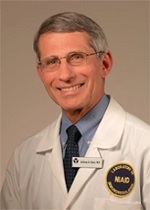 |
| NIAID Director Dr. Anthony Fauci |
As the death toll of West Africa's Ebola outbreak reaches 2,500, GlaxoSmithKline's ($GSK) experimental Ebola vaccine is being tested at the U.S. National Institutes of Health with no apparent ill effects so far, health officials report.
At a congressional hearing this week, Dr. Anthony Fauci, director of the NIH's National Institute of Allergy and Infectious Diseases (NIAID), told legislators that a Phase I trial of GlaxoSmithKline's vaccine has produced no major side effects so far in healthy volunteers.
"So far, 10 of the 20 volunteers have been vaccinated, and thus far there have been no red flags," Fauci said.
The trial, which began Sept. 2 at the NIH campus in Bethesda, MD, is expected to wrap up by the end of November or beginning of December, Fauci said. After that, NIH will expand the studies in the U.K. and Mali to make sure the vaccine is safe and effective. Full results from the trial will be available by the end of the year, he said. Meanwhile, the U.K. reports that it has vaccinated its first volunteer in a clinical trial in Cambridge of the same vaccine.
Fauci acknowledged that the GlaxoSmithKline vaccine, which is being jointly developed with NIAID's Vaccine Research Center, showed promising results in an animal study. But he said it will take further tests in humans to determine whether the vaccine can produce the type of immune response needed to be effective.
The vaccine, which Glaxo acquired in a $325 million deal with Okairos in 2013, uses a chimpanzee cold virus vector containing two ebolavirus gene segments. The vaccine works by entering a cell and delivering the new genetic material, which in turn expresses a protein that triggers an immune response in the body. It does not contain any infectious virus material, so trial participants are not at risk for becoming infected with Ebola.
The NIH isn't putting all its eggs in one basket with the GlaxoSmithKline vaccine. The agency is also collaborating with the U.S. Department of Defense and NewLink Genetics ($NLNK) to begin a Phase I trial of an investigational Ebola vaccine later this fall. Using vesicular stomatitis virus as a vector, or carrier, for an Ebola gene, the vaccine works in a similar manner to the way the chimp adenovirus serves as a vector for the Glaxo vaccine. This vaccine candidate was developed by and licensed from the Public Health Agency of Canada.
Since 2003, the NIAID's Vaccine Research Center has tested three Ebola vaccine candidates at the NIH campus. An additional Phase I clinical trial was conducted in Kampala, Uganda, in collaboration with the Department of Defense. While none of these candidates raised safety concerns in small trials, Fauci said in his testimony that they did not elicit the level of immune response believed to be needed to provide adequate protection against Ebola exposure.
- watch the Sept. 16 Senate hearing
- read Fauci's testimony